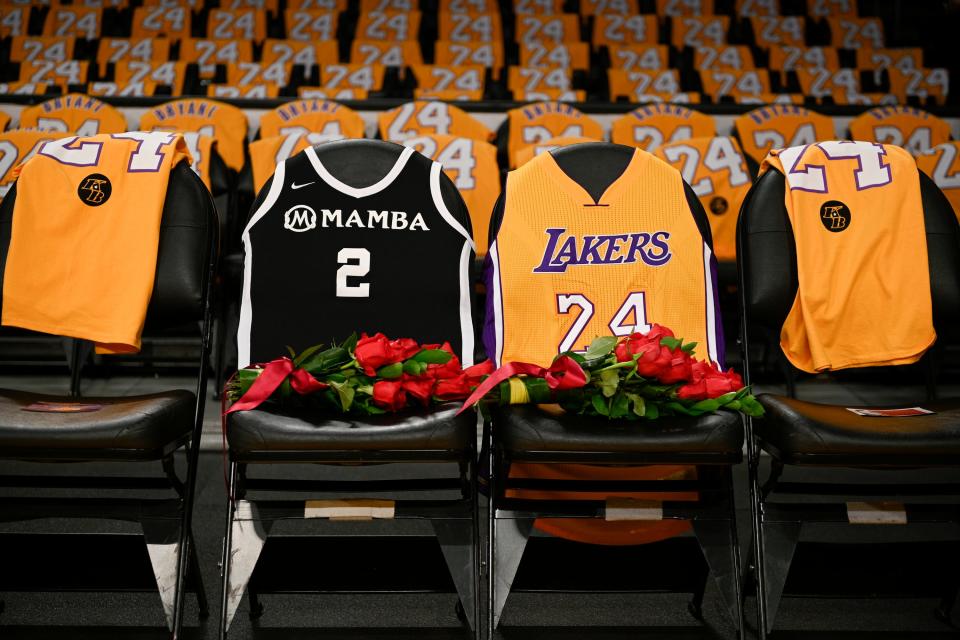Let Kobe Bryant's death be a reminder. Employers must give their staff time to grieve.
Judging from the thousands of people who filled the Staples Center in Los Angeles on Monday for a memorial service, many are still reeling over the unexpected loss of basketball legend Kobe Bryant, his 13-year-old daughter, Gianna "Gigi" Bryant, and the seven other souls after their helicopter crashed in Southern California. One man, though, prayed the tragedy motivates people to live a life they can be proud of.
"As millions mourn the deaths of Kobe and Gianna Bryant and those who died with them, we think about life's brevity, uncertainty," Senate chaplain Barry Black said recently. "Remind us that we all have a limited time on earth to leave the world better than we found it."
One way people, especially those who craft public policy and manage businesses, can use the tragedy as an opportunity to make the world a better place is by acknowledging the magnitude of the heartache that surrounds them and enhancing their bereavement policies accordingly.
Times are changing, and leave policies must, too
Bereavement policies in America, by and large, are outdated and overly narrow. Employees, on average, receive a mere three paid days off after the loss of a qualified loved one — and sometimes, employees receive even fewer days than that.
“The period of absence is usually limited to a few days (for example, three paid days for immediate family members and 1 paid day for other relatives),” reads a report from the Bureau of Labor Statistics.

The Fair Labor Standards Act places no obligation on employers to provide paid time off after the loss of a loved one. As a statement from the Department of Labor reads, “This type of benefit is generally a matter of agreement between an employer and an employee."
Bereavement leave policies, consequently, vary from company to company. Oftentimes, a bereavement policy is nonexistent or meager, and the benefit — if it’s offered at all — is generally limited to immediate family members like a legal spouse, child, parent, grandparent or sibling.
Family dynamics however, are arguably more complicated than ever. Millennial men and women, for example, delay marriage but don't put off romantic attachment. The number of couples who divorce has skyrocketed in recent decades. Though television producer Ricki Lake can attest to the fact that divorce doesn't blunt the sting of loss. As the Pew Research Center says, “The landscape of relationships in America has shifted dramatically in recent decades."
Support paid family leave: That's how to help families and reduce partisanship
Young adults, furthermore, who are new to the workforce with little to no vacation time accrued, and who are often ineligible for short-term disability, are losing friends and relatives — including immediate, step and adopted family members — to alcohol and drug abuse.
Veterans, moreover, are watching their brothers and sisters in arms die at alarming rates. Large numbers of biological families are scattered as people uproot their lives in favor of cities with more job opportunities instead of settling down in their hometown.
Give families the time they need to reconnect and heal
Employees, for this reason, often need more time off than allotted just to travel to and from a loved one’s memorial service, and certainly, all those experiencing loss need more than a few days off to adjust to life without their loved one.
As Shaquille O’Neal, who played basketball alongside Bryant for eight years, said the loss hit him and those in the Lakers community hard. “People are going to say, ‘Take your time and get better,’ but it’s going to be hard for me,” he said. “People here are hurting, especially in this organization.”
The bottom line is that employers should be generous to those who are grieving the death of a loved one, regardless of whether an employee’s loss fits within the strict confines of standard corporate bereavement-leave policies.
What you can do: After my sister's death, there's no formula for healing. But there is a way you can help.
Such a move would go a long way toward building a corporate legacy that influences people’s lives for the better, and it’s a benefit enhancement that tech giant Intel has already implemented, expanding its bereavement leave to up to two paid weeks off. Other companies should follow suit.
As Kaleth O. Wright, chief master sergeant of the Air Force, told Military.com, "It makes a big difference if you walk into a work center where you feel like, hey, I’m a valued member of this team, and my supervisor, my teammates, they care about the things that I’m going through."
Adopting compassionate and inclusive workplace policies that acknowledge peoples’ humanity in the midst of grief is the least the world can do to honor Bryant, his fellow passengers and the loved ones they left behind.
Carolyn Bolton is a content specialist and former newspaper reporter. Follow her on Twitter: @carbolton
You can read diverse opinions from our Board of Contributors and other writers on the Opinion front page, on Twitter @usatodayopinion and in our daily Opinion newsletter. To respond to a column, submit a comment to letters@usatoday.com.
This article originally appeared on USA TODAY: Let Kobe's death be a catalyst. Employees need time to grieve.

